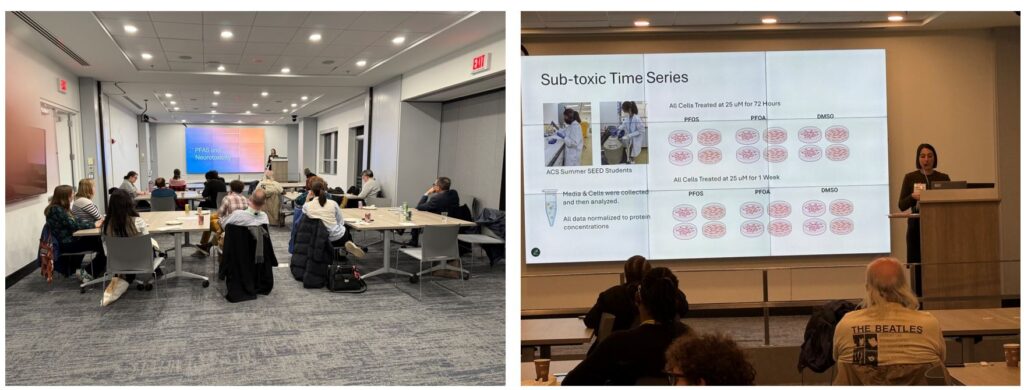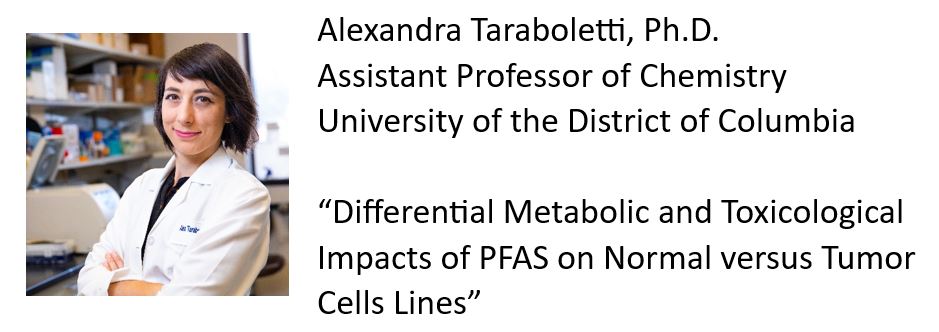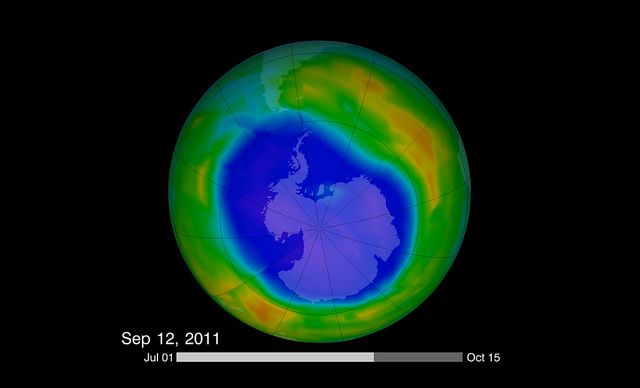Thank you “Dr. T” for the very interesting discussion of this Research Project. The recording is now available – view recording.


DATE / TIME: February 20, 2025
……….6:00 p.m. Check-in / Networking
……….6:30 p.m. Dinner
……….7:00 p.m. Presentation
IN PERSON: Registration Required – csw@acs.org
…………………..ACS Headquarters – Marvel Hall
…………………..1155 16th Street, N.W., Washington, DC 20036
VIA ZOOM: Registration Required – Zoom link
MENU: Meal will be catered by W. Millar & Co. and will feature Fajitas – marinated chicken & steak strips over peppers & onions – with cilantro-lime rice and cumin black beans, flour tortillas, guacamole, cheddar, Tex-Mex salsa and sour cream. Cookies and bars and beverages will be provided. Vegetarian Option will be offered only if requested.
Cost for meal: $20.00 per person (half price for students)
BIO
Dr. Alexandra Taraboletti is a scientist, educator, and science communicator dedicated to advancing research, education, and policy. She is an Assistant Professor of Chemistry at the University of the District of Columbia and a Scientific Program Manager at the Health and Environmental Sciences Institute (HESI). With a PhD in Chemistry from the University of Akron and a postdoctoral fellowship in Tumor Biology from Georgetown University, her research leverages Omics technologies to study human diseases, environmental toxins, and radiation damage, including innovative work in metabolomics-based biodosimetry. Passionate about education, Dr. Taraboletti integrates advanced technologies like metabolomics into inclusive STEM curricula and mentors young scientists through the ACS Project SEED program. As a former science writer for the National Heart, Lung, and Blood Institute (NHLBI), she has contributed to increasing public awareness of critical biomedical topics. Her work bridges research, education, and policy, fostering collaboration and impact across disciplines.
ABSTRACT
Per- and polyfluoroalkyl substances (PFAS) are synthetic compounds that persist in the environment and have been linked to adverse health outcomes. This study investigates the metabolic and toxicological effects of PFAS exposure in normal and tumor-derived cell lines from the prostate (PNT2 and PC-4) and brain (MO3.13 and T98G). Our findings reveal that PFAS exhibit heightened toxicity in the normal cell lines compared to tumor cell lines, with perfluorooctanoic acid (PFOA) demonstrating the highest cytotoxicity across cell types. Metabolic profiling indicates that PFAS disrupt cellular metabolism differently in normal versus tumor cells. In MO3.13 (normal brain) cells, PFAS predominantly impaired glycolytic metabolism, while T98G (glioblastoma) cells showed a more variable metabolic response. These results suggest a cell-type- and metabolism-specific vulnerability to PFAS exposure, emphasizing the need for further research into tissue-specific risks and mechanisms of PFAS toxicity. Insights from this study could inform risk assessment and therapeutic strategies for PFAS-related health impacts.




